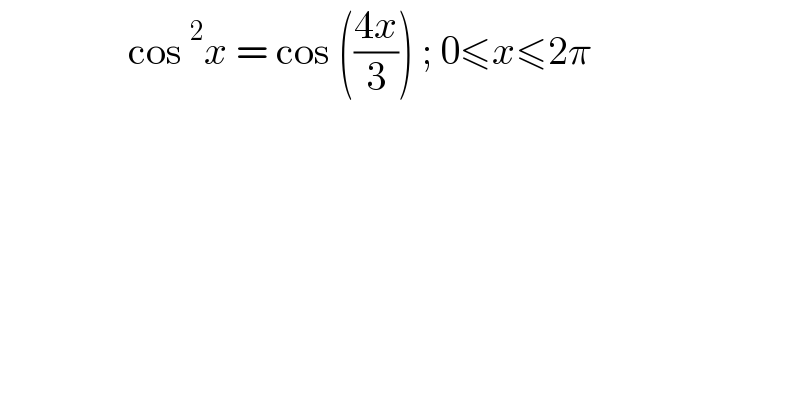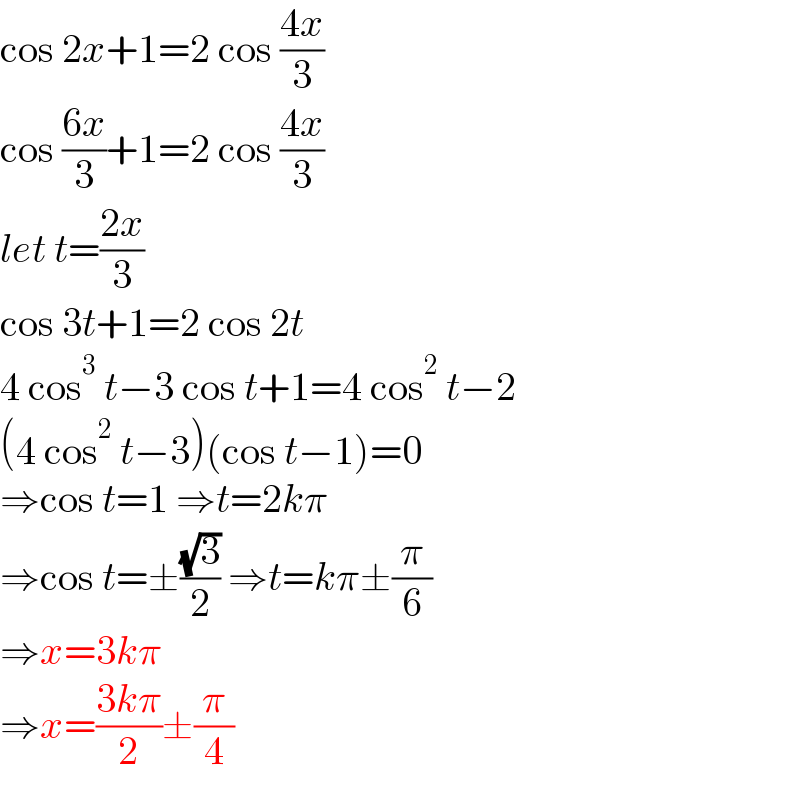Question Number 167486 by greogoury55 last updated on 18/Mar/22

$$\:\:\:\:\:\:\:\:\:\:\:\:\:\:\:\:\mathrm{cos}\:^{\mathrm{2}} {x}\:=\:\mathrm{cos}\:\left(\frac{\mathrm{4}{x}}{\mathrm{3}}\right)\:;\:\mathrm{0}\leqslant{x}\leqslant\mathrm{2}\pi \\ $$
Answered by mr W last updated on 18/Mar/22

$$\mathrm{cos}\:\mathrm{2}{x}+\mathrm{1}=\mathrm{2}\:\mathrm{cos}\:\frac{\mathrm{4}{x}}{\mathrm{3}} \\ $$$$\mathrm{cos}\:\frac{\mathrm{6}{x}}{\mathrm{3}}+\mathrm{1}=\mathrm{2}\:\mathrm{cos}\:\frac{\mathrm{4}{x}}{\mathrm{3}} \\ $$$${let}\:{t}=\frac{\mathrm{2}{x}}{\mathrm{3}} \\ $$$$\mathrm{cos}\:\mathrm{3}{t}+\mathrm{1}=\mathrm{2}\:\mathrm{cos}\:\mathrm{2}{t} \\ $$$$\mathrm{4}\:\mathrm{cos}^{\mathrm{3}} \:{t}−\mathrm{3}\:\mathrm{cos}\:{t}+\mathrm{1}=\mathrm{4}\:\mathrm{cos}^{\mathrm{2}} \:{t}−\mathrm{2} \\ $$$$\left(\mathrm{4}\:\mathrm{cos}^{\mathrm{2}} \:{t}−\mathrm{3}\right)\left(\mathrm{cos}\:{t}−\mathrm{1}\right)=\mathrm{0} \\ $$$$\Rightarrow\mathrm{cos}\:{t}=\mathrm{1}\:\Rightarrow{t}=\mathrm{2}{k}\pi \\ $$$$\Rightarrow\mathrm{cos}\:{t}=\pm\frac{\sqrt{\mathrm{3}}}{\mathrm{2}}\:\Rightarrow{t}={k}\pi\pm\frac{\pi}{\mathrm{6}} \\ $$$$\Rightarrow{x}=\mathrm{3}{k}\pi \\ $$$$\Rightarrow{x}=\frac{\mathrm{3}{k}\pi}{\mathrm{2}}\pm\frac{\pi}{\mathrm{4}} \\ $$
